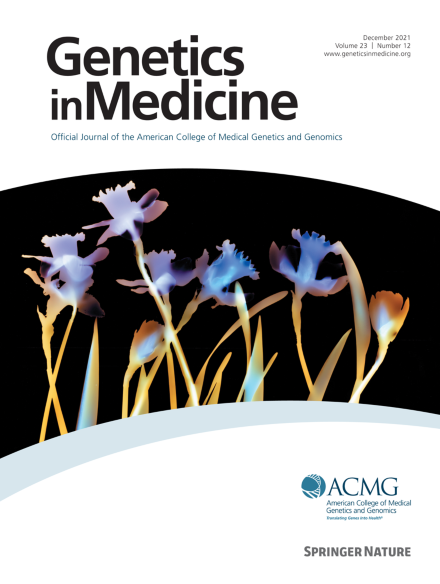RYBP的新生变异与严重的神经发育障碍和先天性异常有关。
IF 6.6
1区 医学
Q1 GENETICS & HEREDITY
引用次数: 0
摘要
目的:Polycomb group (PcG)蛋白是基因转录的关键表观遗传调控因子。多种神经发育障碍与编码PcG蛋白的基因的致病性变异有关。RYBP是非规范Polycomb Repressor Complex 1的核心成分;然而,它在疾病中的作用尚不清楚。方法:通过体外细胞研究和黑腹果蝇体内研究来评估RYBP变异的功能后果。结果:我们描述了7例RYBP杂合从头变异体,临床表现包括严重的发育迟缓、畸形和多种先天性异常。我们发现RYBP的所有单核苷酸变异都定位于该基因的n端结构域,该基因编码锌指结构域和泛素结合片段。体外研究表明,RYBP c.132C>G . p.(Cys44Trp)变异导致蛋白表达降低,但不影响YY1、RING1B或泛素的结合。在黑腹果蝇体内的过表达研究表明,RYBP在功能上与人类有显著差异,其变体形式影响C44氨基酸残基。DNA甲基化研究提示一个可能与rybp相关疾病相关的特征。结论:RYBP的杂合新生变异与可识别的综合征性神经发育障碍伴多发性先天性异常有关。本文章由计算机程序翻译,如有差异,请以英文原文为准。
De novo variants in RYBP are associated with a severe neurodevelopmental disorder and congenital anomalies
Purpose
Polycomb group proteins are key epigenetic transcriptional regulators. Multiple neurodevelopmental disorders are associated with pathogenic variants of the genes encoding Polycomb group proteins. RYBP is a core component of the noncanonical Polycomb Repressor Complex 1; however, its role in disease is unclear.
Methods
Functional consequences of RYBP variants were assessed using in vitro cellular and in vivo Drosophila melanogaster studies.
Results
We described 7 individuals with heterozygous de novo variants of RYBP and their clinical findings, including severe developmental delay, dysmorphisms, and multiple congenital anomalies. We showed that all single-nucleotide variants in RYBP localize to the N-terminal domain of the gene, which encodes the zinc-finger domain and ubiquitin-binding moiety. In vitro studies have demonstrated that the RYBP c.132C>G p.(Cys44Trp) variant causes reduced protein expression but does not affect the binding of YY1, RING1B, or ubiquitin. In vivo overexpression studies in Drosophila melanogaster showed a dramatic functional difference between human RYBP and its variant forms, affecting the C44 amino acid residue. DNA methylation studies suggested a possible episignature associated with RYBP-related disorder.
Conclusion
Heterozygous de novo variants in RYBP are associated with an identifiable syndromic neurodevelopmental disorder with multiple congenital anomalies.
求助全文
通过发布文献求助,成功后即可免费获取论文全文。
去求助
来源期刊

Genetics in Medicine
医学-遗传学
CiteScore
15.20
自引率
6.80%
发文量
857
审稿时长
1.3 weeks
期刊介绍:
Genetics in Medicine (GIM) is the official journal of the American College of Medical Genetics and Genomics. The journal''s mission is to enhance the knowledge, understanding, and practice of medical genetics and genomics through publications in clinical and laboratory genetics and genomics, including ethical, legal, and social issues as well as public health.
GIM encourages research that combats racism, includes diverse populations and is written by authors from diverse and underrepresented backgrounds.
 求助内容:
求助内容: 应助结果提醒方式:
应助结果提醒方式:


